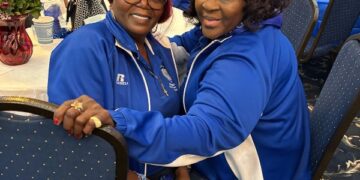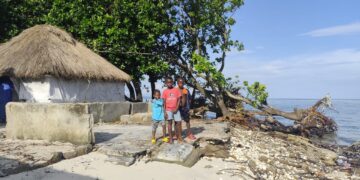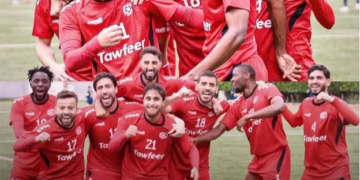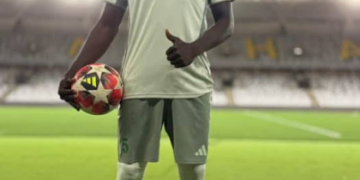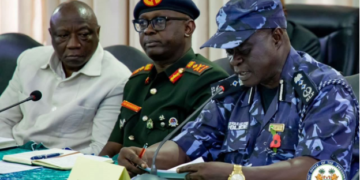By Alpha Amadu Jalloh
Mr. President, I know you are away gradually rolling from Liberia to Italy and now to Ethiopia, and yet, our nation groans under the weight of neglect and corruption. As our beloved Sierra Leone sinks deeper into chaos, I cannot remain silent. The rumors, the damning research, and the lived reality of our people all point to a single, inescapable truth: while you abscond in foreign lands, the drugs trade has infiltrated every crevice of our society, poisoning our youth, tarnishing our institutions, and turning our security apparatus into unwitting or perhaps even willing agents of destruction.
For too long, Sierra Leone has been the stage for a drama of betrayal. Recent investigations, including groundbreaking research by international agencies and local experts alike, have uncovered a disturbing nexus between state institutions and the burgeoning drug networks that now strangle our communities. We now have credible evidence linking our police, our security forces, and even certain government ministers to the proliferation of narcotics. It is alleged that you, Mr. President, have positioned yourself as the lead host for over 17 notorious drug lords in our sweet Mama Salone. Such allegations, while explosive, are not without foundation. Multiple studies have demonstrated that Sierra Leone has unwittingly become a transit and distribution hub, a veritable conduit for illicit drugs flowing from West Africa to Europe and beyond.
The research is as damning as it is detailed. Independent reports commissioned by international watchdogs have identified a disturbing trend: when state institutions are compromised, they transform into facilitators rather than fighters against the drug menace. Field investigations reveal that high-ranking officers in our police force have not only turned a blind eye to drug trafficking but have actively participated in the logistics of distribution. These officials, in collaboration with security agencies, while the Ministry of Information and Civic is busy whitewashing or downplaying, used their power and influence to protect drug networks that thrive on the despair of our youth. How can a nation hope to prosper when the very institutions tasked with safeguarding our people have become the gears accelerating the proliferation of drugs in Sierra Leone and, by extension, the world at large?
Consider, for instance, Mr. President, the unsettling case of the Dutch journalist. Arrested on charges of espionage, she was reportedly caught “hibernating” in the Peninsular area, a euphemism for her clandestine investigation into the nexus of drugs and state power. How would you explain this, Mr. President? Her detention is emblematic of a broader trend: a systematic effort to silence dissent and obstruct transparency. Instead of facing the real culprits who enable the drug trade, the state apparatus preys on those who dare shine a light on its corrupt underbelly. When the press is muzzled and dissenters are detained, one must ask: who is truly safeguarding the nation’s interest, and who is complicit in its downfall?
Yet another chapter in this sordid narrative involves Jos Leijdekkers, infamously rechristened as “Umaru Sheriff” after his dubious “baptism” into the inner circles of our state apparatus. Sierra Leoneans continue to demand clarity: How did Jos Leijdekkers gain such unfettered access to our corridors of power? Who gave him the authority to operate under a veneer of legitimacy while masterminding networks that fuel the drug trade? The transformation of a foreign national into a local enforcer under a name that evokes both reverence and revulsion speaks volumes about the moral decay infecting our leadership.
Meanwhile, the plight of our youth is being exacerbated by the relentless spread of a drug known colloquially as “KUSH.” This substance, which has found its way into neighborhoods across Sierra Leone, is decimating lives and futures. Instead of confronting this crisis head-on, the government remains conspicuously silent. No public statements address the staggering rise in addiction rates; no policies are enacted to provide rehabilitation for our afflicted young people. Instead, the apparatus designed to protect our security forces is entangled in the very networks that supply the drugs, effectively condemning our youth to a cycle of abuse and despair.
One cannot ignore the broader implications of these revelations. Sierra Leone is not merely grappling with an internal crisis; it has become a fulcrum in the international drug trade. Agencies such as Europol and the Drug Enforcement Administration (DEA) have taken a keen interest in our country. Their investigations, though still in their early stages, indicate that the tentacles of this drug network extend far beyond our borders. As these agencies tighten their grip on global drug traffickers, it is only a matter of time before the full extent of our government’s involvement is exposed. Mr. President, while you may be preoccupied with maintaining your personal exile, the international community is closing in, and the repercussions of inaction will soon be unavoidable.
It is no exaggeration to say that the very fabric of Sierra Leone is being eroded from within. Our national identity, once defined by resilience and hope, is now tainted by the insidious presence of corruption and vice. The research on drug trafficking within our borders is not merely an academic exercise; it is a wake-up call for every citizen who still believes in the promise of a brighter future. The evidence shows that the government’s passive, or in some cases, active, involvement in these networks is undermining not only our social structures but also the trust that binds us as a people.
The message is clear: Mr. President, leadership matters. When the highest office in the land is occupied by someone who chooses exile over accountability, who prioritizes personal safety over national duty, then the state is doomed to collapse from within. Our police, our security agencies, and even our youth groups, which were once the bulwarks of our national security, have all been co-opted into a system that values power and profit over the welfare of the people. The irony is palpable: those entrusted with protecting us have become the very instruments of our degradation.
Furthermore, Mr. President, the implications for international security are profound. Sierra Leone’s role as a transit point for drugs has placed us on the radar of global law enforcement, and as agencies like Europol begin to share intelligence, it is inevitable that pressure will mount on our government. This external scrutiny, rather than prompting reform, seems destined to further isolate us from the global community. The stain of corruption, once made public, could jeopardize international aid, trade, and diplomatic relations, consequences that will only deepen the crisis at home.
In the face of such overwhelming evidence, what remains for the people of Sierra Leone? Our voices have been drowned out by a cacophony of silence and complicity. Our institutions, once symbols of justice and order, now serve as shields for those who would exploit them. The call for reform is not new; it echoes the sentiments of countless citizens who have long demanded accountability and transparency. Yet, each time a brave soul steps forward to expose the truth, they are met with repression, a warning that the cost of speaking out may be too high.
Mr. President, I am not the first to challenge you, nor will I be the last. This talk is not an exercise in hyperbole; it is a plea for truth and a call for justice. You must answer the questions that have long haunted our nation: What have you done to combat the rampant drug trade that is destroying our communities? How do you justify the complicity of your security apparatus, which seems more invested in protecting the drug lords than in safeguarding our citizens? And why have you remained silent about the damaging influence of your family’s involvement in this nefarious network?
The international community is watching, and so are we, the citizens of Sierra Leone. The DAE, Europol, and other agencies are closing in on anyone involved in these illicit activities. It is only a matter of time before the full scope of this corruption is laid bare for all to see. I urge you to consider that accountability is not a threat but rather an opportunity to rebuild the trust that has been so callously betrayed. Leadership is defined not by evasion and silence but by courage and the willingness to confront difficult truths.
If you truly care about the future of Sierra Leone. Mr. President, then take immediate steps to address these issues. Launch a full-scale, transparent investigation into the allegations linking your government to the drug trade. Hold those in your security forces accountable, regardless of rank or affiliation. Engage with independent researchers and international agencies to ensure that our nation’s role in this global crisis is understood and addressed. Most importantly, speak out to the people of Sierra Leone. Reassure us that our leaders will not allow corruption to rob us of our future and that, together, we can restore the dignity and integrity of our beloved nation.
Mr. President, this is not merely an empty talk; it is a message of warning and a call to action. Our country, our youth, and our future hang in the balance. The road ahead is fraught with challenges, but the alternative, a path defined by corruption, repression, and despair, is simply unacceptable. Let this be the moment when truth prevailed over deceit, when accountability triumphed over complicity. For the sake of Sierra Leone and all who call it home, we implore you to answer these questions and act decisively before it is too late. “Ar don tell yu O, Fo Leh Yu No Say Ar nor Bin Tel Yu Tumara”.


